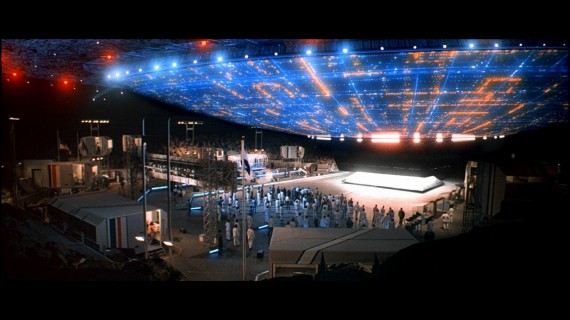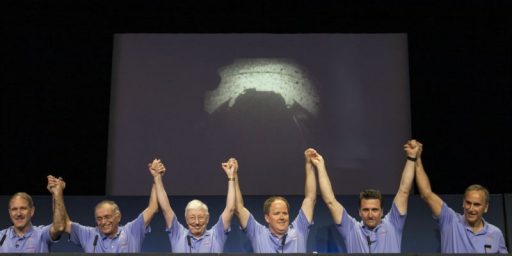Would Religion Survive The Discovery Of Alien Life?
Would faith survive the discovery that the central premise of the Bible is a lie?
Via Andrew Sullivan, I was led to an interesting question posed by Mike Wall, who asks whether religion on Earth would suffer if we found definitive evidence of life on other planets:
The discovery of life beyond Earth would shake up our view of humanity’s place in the universe, but it probably wouldn’t seriously threaten organized religion, experts say.
Religious faith remains strong in much of the world despite scientific advances showing that Earth is not the center of the universe, and that our planet’s organisms were not created in their present form but rather evolved over billions of years. So it’s likely that religion would also weather any storms caused by the detection of E.T., researchers say.
“I think there are reasons that we might initially think there are going to be some problems,” said Doug Vakoch, director of Interstellar Message Composition at the SETI (Search for Extraterrestrial Intelligence) Institute in Mountain View, Calif. “My own hunch is they’re probably not going to be as severe as we might initially think.”
First of all, let’s emphasize something I think is very important. Outside of the Abrahamic religions (Judaism, Christianity, and Islam), it’s unlikely that the discovery of life, intelligent or not, outside of Earth would have any significant impact on religious beliefs. Buddhism and Hinduism in particular seem to be two religious faiths that would be eminently adaptable to such a changed circumstance. So, in some sense, what we’re really talking about here is the impact that the discovery of extraterrestrial life would have on the religions that grew out of the Middle East starting some 6,000 years ago.
In some sense it might depend on what kind of discovery we’re talking about here. If evidence is found of microscopic life on Mars, or perhaps even fossilized evidence of more advanced forms of life that may have roamed the red planet at some point in the very distant past, that wouldn’t necessarily be perceived as something that threatens the core beliefs of any faith any more than the discovery of a new species of fish would. The matter becomes quite different, however, if we start talking about intelligent life similar to humanity, or even a form of life potentially more advanced than we are. Still, Wall argues that humanity would not abandon it’s religious beliefs quite so easily:
The Bible, Koran and other sacred texts of the world’s major religions stress God’s special concern for humanity and for Earth. So the discovery of aliens — microbes on Mars, say, or signals from an intelligent civilization in another solar system — might seem threatening, by implying that we and our planet aren’t all that special.
But our species has had plenty of time to get used to this idea. Nicolaus Copernicus made perhaps the first powerful case for it in 1543, when his seminal work “On the Revolutions of the Celestial Spheres” showed that Earth revolves around the sun, rather than the other way around.
“We haven’t been the center of the universe for a while now — four centuries,” said panelist Seth Shostak, a senior astronomer at the SETI Institute.
And recent alien planet discoveries continue to remind us of this fact. Scientists have already detected more than 700 planets beyond our solar system, and several thousand more await confirmation by follow-up observations. Some of these exoplanets are small and rocky, like Earth, and some orbit in their stars’ habitable zone, that just-right range of distances where liquid water could exist on the planet.
We also have a few historical test runs that shed light on how people might react if we ever do discover E.T., Shostak added.
In the early 20th century, for example, many people regarded the so-called ”canals” of Mars as strong evidence of an intelligent civilization on the Red Planet. And in the mid-1990s, scientists announced the discovery of possible microfossils in the Martian meteorite known as ALH 84001.
In neither case did the walls of churches, mosques and temples start to crumble.
“This experiment’s been run many times, and people never go nuts,” Shostak said. (The debate over ALH 84001 continues today, but most Mars scientists remain unconvinced that it contains strong indications of life.)
George Dvorsky agrees with Wall:
Indeed, as [SETI specialist Doug] Vakoch noted, Baptist theologian Dr. Ostrander would be prepared to make the mental switch:
Dr. Ostrander is adamantly opposed to evolution, and yet he has no problem with the idea of there being extraterrestrials. He says it’s as if a couple has one child, and then they decide to have a second child. Is that second child any less special? So too if God decides to have life on our planet, and then another planet, and another planet. It doesn’t make us less special.
I tend to agree with Wall and the others. Religion has been a part of humanity in one form or another for tens of thousands of years at least. It started out as the belief that the sun, the moon, the stars, and the weather, were all controlled by gods to whom sacrifices must be made for good fortunate and evolved over time into the religious philosophies we know today. Throughout that entire time man’s thirst for knowledge has unlocked the secrets of nature, and to some extent, the universe to the point where someone like Stephen Hawking can say that it is possible to posit an entire theory explaining the creation of the universe that eliminates the need for a Supreme Being.
And yet religion, or at least religious faith, still survives.
I’ve been an atheist for at least twenty years now, but I’ve never considered myself very militant about, unlike the Richard Dawkins’ of the world. Absent them using the power of the state to force their belief upon me, I honestly don’t care if religious people continues to believe what they believe. For the most part, I’ve found people of faith to be about the same as any other human being, there are good people and there are bad people, but my general impression of most religious people is that they are just honestly trying to live a good life. I don’t try to change their minds, and they don’t try to change mine. And, I doubt that there’s much that could change their mind. If thousands of years of scientific knowledge isn’t going to cause people to reject the idea of the supernatural, does it really make sense to think that evidence of life beyond Earth will finally be the breaking point? I don’t think so.
This entire question reminds me of one of Arthur C. Clarke’s greatest short stories, The Star, which tells the story of a human interstellar expedition far in the future that includes among its crew a Jesuit Priest. In their travels the crew encounters the remnants of a long dead star system that once housed a civilization not unlike humanity. Eventually, the priest discovers that the systems star went supernova at a time that would have meant that its light reached Earth when Christ was born, thus leaving him to ponder the question of why this civilization had to be destroyed so that God could bring his revelation to humanity. You can read the whole story here. The point is, if an incident like that would not destroy religious faith, then I have to wonder if anything ever will.







Wouldn’t be a problem for the Scientologists. Now the Abrahamic fundies simply wouldn’t believe the evidence even if a spaceship landed in their back yard. The other religions probably wouldn’t have a problem.
I look at this quandry from a slightly different angle, via negative implication. The big 3 religions have survived the crusades, the black plague, WWI, the influenza pandemic, WWII and the holocaust. If they survived intact those calamities they can survive intact pretty much anything.
I could see the Abrahamic Faiths being shaken up a bit by it. They were shaken up a bit when they found native Americans back in the 15th century – a group of people who weren’t Christians or people who had rejected Christianity, just never experienced it. Were they damned to hell?
You’d see a bunch of the same type of questions if we discover an alien civilization, particularly one with aliens that realistically nothing resembling human. What impact would that have on “created in the image of God” beliefs? I could see Mormons especially having some issues with it.
These days people just make up the reality that they want to believe in. I believe that many Christians would say that the Aliens’ ancestors were on Noah’s Ark and later ascended to heaven in Jerusalem, and from there they were sent to some far off planet to plan the return to Earth (something like that …)
I’m not sure that
More than likely the Christians and Muslims would send missionaries a la Ray Bradbury in his Martian Chronicles (fun story, by the way).
It’s a good bet that these Christians see the rest of us humans as aliens from the home planet.
“Yes, we believe that the Europeans and their descendants are the chosen people of God,” according to the website for Christian Identity Ministries, which is holding the event with Church of God’s Chosen.
http://usnews.msnbc.msn.com/_news/2012/07/05/12583500-whites-only-christian-gathering-riles-some-alabama-neighbors
@Ron Beasley:
Wouldn’t affect the Mormons much. They would have to sort out which of their people is the aliens God, but that woudl be just book-keeping, really.
Catholic dogma 101 in my school said that “Where there is no doubt, there can be no faith.” In other words, if you cannot handle scientific truth that apparently contradicts the Bible (or one of the early Church fathers), then what you have isn’t really faith – it’s the need for certainty. And if you need certainty before you consider yourself a Catholic, then that’s not really faith.
This was how they handled a lot of those “But…but…but….evolution! miracles! Shroud of Turin!” questions that kept coming at them from the students. And the point is that it’s not up to God to make you feel all warm and fuzzy about believing. “Put not the Lord thy God to the test” and all that.
Biblical inerrancy was never really a Catholic thing.
I see no problem for Christians: “I believe in God the Father Almighty, Creator of heaven and earth, and of all things visible and invisible” (Nicene Creed, standard statement of faith for the Christian church). This covers it all.
New found intelligent life forms represent no problem for Christians; just new potential believers and church members!
I think we all know that the only alien around here is the Kenyan Obama…
@anjin-san:
I’ll tell you why I have my doubts about God – I’ve never seen God’s long form birth certificate.
Larry Niven did a take on this issue in one of his Draco Tavern stories, “The Subject Is Closed”, about a priest who spoke to an alien race, who said they knew all they wanted to about life after death, from another race who performed experiments on the subject, which led the entire race to commit suicide. The characters speculated that the race found that there’s a heaven, and couldn’t wait to get there, or that life after death gets worse, the longer one lives, or that there’s nothing after death, and they couldn’t take the knowledge.
Dogma might suffer, but humanity is hard wired for religion, therefore people would continue to believe to the same degree they did before. Ours is a narrative of a species that has figured out how to attain awareness and understanding of new elements that appear in our world, incorporate them, and move forward. And the very few that have no religion or theism at all, the lazy-minded agnostics, would have no problem ignoring this new piece of the puzzle the way they ignored all the rest.
IMHO religious people would have an easier time with alien existence than the less believing, since spirituality gives its possessors somewhere to turn to explain the unexplained.
@Moosebreath:
Speaking of Larry Niven, “The Mote in God’s Eye.”
And for the record, humanity could not survive another intelligent species.
@OzarkHillbilly:
And for the record, humanity could not survive an
otherintelligent species.FIFY 😉
Speaking as a Jew, in my entire life I can’t recall ever having encountered a rabbi, no matter how fundamentalist, who was opposed to the possibility of life elsewhere in the universe. I’ve even seen some bring sources to support it. As far as I can tell, it’s a non-issue in Judaism.
I still can’t believe it’s survived this long. There’s apparently no end to humanity’s appetite for bullsh!t.
Religions, like libertarianism, cannot withstand exposure to the real world…much less aliens.
They would take a serious beating, but if they could adapt to the new reality they could survive. Chances are however they would more likely drag us all into an interplanetary war which would last all of about 15 minuets… with humanity loosing.
“Would Religion Survive The Discovery Of Alien Life?”
Really, would the aliens survive?
6 years after the discovery of extraterrestrial life polls will show that 47% of Americans don’t believe it.
@Michael Gersh:
Hardwired indeed. More than likely a significant number of people would believe they are demons and a like number that they are angels.
Who’s to say that the aliens would not bring their own religion along with them. Perhaps they would stop by to spread the good word. Any slaves and gold they pick up along the way would simply be proof of their god’s love.
We should get some Hollywood types to land a fake spacecraft with aliens in the tribal areas of Pakistan and test these theories.
@Just ‘nutha ig’rant cracker:
HA! Thanx Cracker. You are, of course, quite correct.
All the way back in 1958, SF author James Blish did a good job of exploring this question in A Case of Conscience.
The story’s protagonist is a Jesuit priest sent to investigate (for the Church) an alien race without religion, but with a highly developed moral sense.
C.S. Lewis takes a whack at it, too, in Out of the Silent Planet. This posits an alien race on Mars with no conception of Original Sin.
While Exotheology isn’t a huge field, it is a field of study within Christian scholastics and ethics. In 2009, the Vatican’s Pontifical Academy of Sciences sponsored a week long workshop on the meaning of extraterrestrial life, so I don’t think they’re terribly upset over the possibility.
Of course religion would survive. I reckon it’s already survived worse.
We have people stating that the discovery of the Higgs Boson actually verifies that God exists, because it was called the God particle. You think something as simple as an alien is going to make religious people change their minds?
@Michael Gersh:
Soooo, let me get this straight.
You were conveniently born into the one true religion of the multitudes imagined by humans over thousands of years.
This religion elevates you above all other species on the planet, in fact, literally in God’s image.
Furthermore, your faith gives you certainty that whatever you decide to believe is “truth” and all others who contradict it are at best, misguided, or otherwise evil and hence diametrically opposed to yours and God’s benevolent will.
I am sorry, but it is beyond easy to accept the view that you are God’s chosen and that anybody that contradicts you is necessarily wrong/evil.
John Burgess is on to something. C.S. Lewis, a writer loved by Evangelicals, mainline Protestants and Catholics, explored the whole question in his Space Trilogy. I don’t see that discovery of intelligent life outside the earth would be a problem for Abrahamic faiths.
The purpose of the Institute is to protect the Institute.
@monkeyboy:
You must be confusing me with someone else. My religion, or even if I have one, is not at issue, and I posted not a single word about that in any case. To me, even atheists are religious, since they have come to a firm conclusion with no evidence, which is what humans are hardwired to do. There are truly unknowable elements of our universe and origins. Religion is an ability that we evolved so that we could deal with that. Catholics, Buddhists, Wiccans are examples of religions that grapple with these issues. Atheism does so as well.
What I can’t understand is that there are people who do not think, or care, about these things.
As I posted above, it seems to me that religious people will have a far easier time dealing with an alien race, especially if they are threatening to us. Sorry if you could not read that from my post, Monkey Boy.
@Christopher Bowen:
Read yesterday somewhere that the guy credited with calling it the “God Particle” wanted to call it the “Goddamned Particle”.
Says the 1%er that writes it…and for kids too…….
lol now someone is getting somewhere…
Expect for the hardwired part, there is great study into this….if you guys ever peeked out of your cubicles for more time then it takes to scream racist, bigot, or homophobes you might have known about it.
No, the problem is that it would be very difficult that the discovery of Alien Life would happen in the same way that happens in movies and in comic books. It would fair more probable that we could see some planet with somekind of primitive life via telescopes. In fact, interacting with aliens is not much more of realist proposition than religion is.
Wow. Is this Outside The Beltway or the Daily Kos?